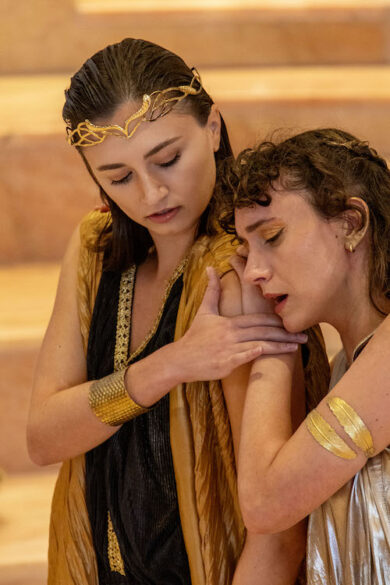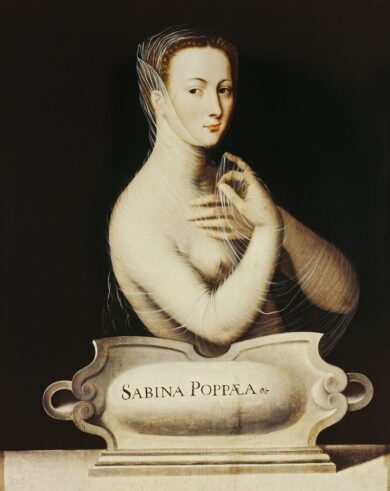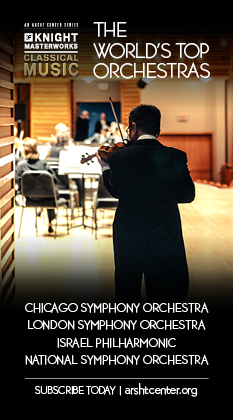An abridged “Poppea” proves a compelling musical drama at MBMF

Christine Boddicker (left) as Nero and Catherine Durcan as Poppea in Monteverdi’s The Coronation of Poppea at the Faena Forum, presented by the Miami Beach Music Festival. Photo: Dennis Oda/MBCMF
Monteverdi’s 1643 opera The Coronation of Poppea is one of the crowning theatrical monuments of the Baroque era. The tale of the conniving noblewoman Poppea’s plan to join the Emperor Nero on the throne is replete with lust and moral ambiguity. On Saturday afternoon, the Miami Beach Classical Music Festival presented a streamlined version in the unique ambience of the Faena Forum Amphitheater.
Located on the second floor of the arts building in the sprawling Faena development on Collins Avenue, the amphitheater comprises four rows of raised seating in the round surrrounding a central platform. Corrine Hayes’ production took full advantage of the space’s intimacy. The singers were often just feet, even inches away from audience members. The impact of the drama, enacted with gripping intensity, was all the more potent. With this abridged edition running a trim two-and-one-half hours with intermission, Hayes kept the action at fever pitch. The tumultuous events of ancient Rome were strikingly realized with economy of means.
Christine Boddicker was a statuesque Nero, a monarch in bearing and voice. Her powerful, multi-colored mezzo yet had the dexterity to throw off trills and roulades with ease and elan. Boddicker’s declamation was bold and strongly present but her singing was never forced. The distinctively reedy timbre of Catherine Durcan’s soprano captured Poppea’s cynicism. In the opera’s later stages, Durcan’s bright upper register took wing.
There was real chemistry and sexual tensions in the Nero-Poppea confrontations. Durcan displayed fiery temperament as she demanded Nero’s exile and dethroned his wife Ottavia. While some musicologists have questioned whether the aging Monteverdi wrote the concluding duet “Per ti miro,” it is the score’s crowning glory. Holding a gold cloth which was gradually wrapped around the joyous Poppea, Durcan and Boddicker’s voices melded with winning elegance.
The opera could well have been titled Ottavia, so strongly dynamic was Gianna Terranova’s portrayal of the ill-fated wife. With a large, rich and commanding mezzo, Terranova’s fiery initial monologue had the immediacy of verismo but with pristine attention to Baroque style. Her farewell to Rome was delivered with seething intensity. Terranova’s entire performance shows evidence of a young yet major singing actress.
The role of Seneca, the scholar and advisor to Nero, is usually sung by a bass. The noble declamation and mahogany tonal palette of Estefania Aslalema’s mezzo proved a delightful surprise and in no way lessened the role’s pivotal status. Sparks flew in the scene between Seneca and the emperor, Boddicker brandishing a knife. When Seneca was ordered to take poison, Aslalema made his acceptance of death an infinite duty in melting tones, her exit up the risers a gripping moment as the offstage chorus of his followers called out “Seneca, do not die.”
As Ottone, Poppea’s jilted lover who attempts to kill her at Ottavia’s behest, Jackie Conlon expressed due anguish, with a sumptuous mid-range. Sarah Richards displayed an appealing high soprano as Drusilla who loves Ottone and joins him in exile and happiness despite being stripped of their noble titles and privileges.
The goddeses of fortune, virtue and love debate their ability to influence events and relations in the prologue and remain present during major events of the drama. Alexandra Larios started somewhat tentatively as Fortune but her singing gained poise and gleam as she warmed up. Richards doubled as Virtue with great agility for her flights of coloratura. Naysa Marrero was a personality plus Amore, bolstered by a solid, well controlled soprano.
Daniel Perez was the Pretorian guard captain Liberto (and friend of Seneca sent to inform him of Nero’s command for his suicide), Perez revealed a promising tenor and striking stage presence. Bryan Coral’s lighter tenor was appropriate for the partying poet Lucano. Josie Gore, Valentina Gomez and Anabelle Calles provided entertaining cameos in supporting roles.
Leading an ensemble of five strings and keyboard continuo, Sandra Lopez Neill (a voice professor at the University of Miami’s Frost School of Music and herself a soprano with major credits) showed a fine sense of Baroque style, with tempos that always moved without being rushed. The players’ precision of execution was totally admirable.
Paulina Lozano’s period costumes avoided Hollywood kitsch and Alejandro Garay’s simple props facilitated the action. Despite the production’s limited scale, this was a compelling and musically satisfying Poppea.
The Miami Beach Classical Music Festival repeats The Coronation of Poppea 5 p.m. Sunday at the Faena Forum Amphitheater in Miami Beach. miamimusicfestival.com
Posted in Performances
Leave a Comment
Sun Jul 23, 2023
at 1:17 pm
No Comments




